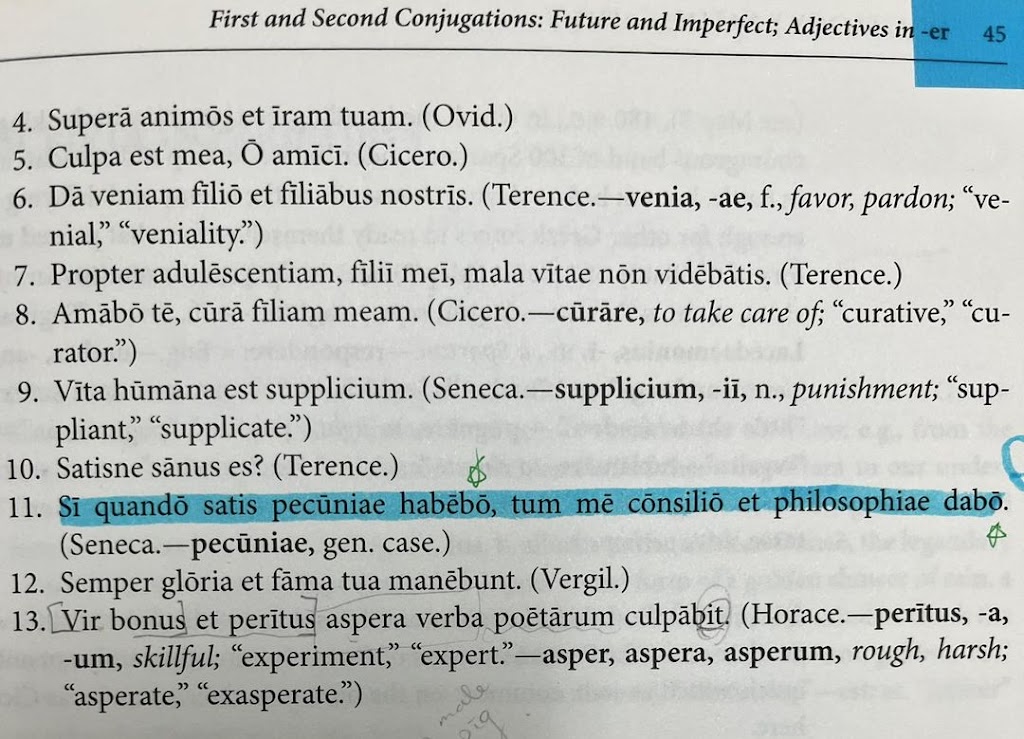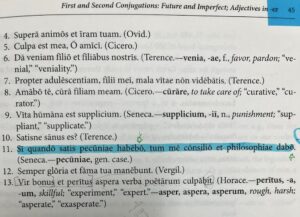CAPVT XX
Fourth declension
本章內容簡易,就是介紹第四變化名詞以及ablative
case作為從哪地來、與某物遠離之意的例子。
第四變化規則如下:
|
Fructus, m., fruit
|
|
Cornu, n., horn
|
|
|
Fructus
Fructus
Fructui
Fructum
Fructu
|
-us
-us
-ui
-um
-u
|
Cornu
Cornus
Cornu
Cornu
Cornu
|
-u
-us
-u
-u
-u
|
|
|
|
|
|
|
Fructus
Fructuum
Fructuibus
Fructus
Fructuibus
|
-us
-uum
-ibus
-us
-ibus
|
Cornua
Cornuum
Cornibus
Cornua
Cornibus
|
-ua
-uum
-ibus
-ua
-ibus
|
Ablative of
place from which在之前就已經看過,這樣的用法通常會搭配介係詞如ab, de, ex,如:
Graeci a patria
sua ad Italiam navigaverunt.
The Greeks sailed from their own land to Italy.
Flumen ad montibus
in mare fluxit.
The river flowed from montains into the sea.
Multi ex agris in
urbem venient.
Many men come from fields into the city.
Cicero hostes ab urbe misit.
Cicero sent the enemy away from the city.
而ablative
of separation則表示有某人或是某物與某物分開、隔開(someone
or something is separate from another),這個用法並非表示透過動作、運動從某地到另一處,而且通常不會有介係詞。尤其是在to
free, to lack, to deprive這些意義時。如:
Cicero hostes ab
urbe prohibuit.
Cicero kept the enemy away from the city.
Eos timore
liberavit
He freed them from fear.
Agricolae pecunia
saepe carebant.
Farmers were often lacking money.
VOCABVLA
|
NOUN
|
|
Coniurati, coniuratorum
|
m
|
Pl. conspirators
|
|
Cornu, cornus
|
n
|
Horn
|
|
Fructus, fructus
|
m
|
Fruit; profit, benefit, enjoyment
|
|
Genu, genus
|
n
|
Knee
|
|
Manus,
manus
|
f
|
Hand; handwriting; band
|
|
Metus, metus
|
m
|
Fear, dread, anxiety
|
|
Mons, montis
|
m
|
Mountain
|
|
Senatus, senatus
|
m
|
Senate
|
|
Sensus, sensus
|
m
|
Feeling, sense
|
|
Servitus, servitutis
|
f
|
Servitude, slavery
|
|
Spiritus, spiritus
|
m
|
Breathing; spirit, soul
|
|
Versus, versus
|
m
|
Line of verse
|
|
ADJECTIVE
|
|
Communis, communis, commune
|
|
Common, general, of/for the community
|
|
Dexter, dextra, dextrum
|
|
Right, right-hand
|
|
Sinister, sinistra, sinistrum
|
|
Left, left-hand; harmful, ill-omened
|
|
VERB
|
|
Careo, carere, carui, cariturum
|
|
+abl, of separation, to be without, to deprived of,
want, lack; be free from
|
|
Defend, defedere, defendi, defesum
|
|
To ward off; defend, protect
|
|
Discedo, discedere, discessi, discessum
|
|
To go away, depart
|
|
Odi, odisse, osum
|
|
A DEFECTIVE VERB, force, to hate
|
|
Prohibeo, prohibere, prohibui, prohibitum
|
|
To keep (back), prevent, hinder, restrain, prohibit
|
|
Pronuntio, pronuntiare, pronuntiavi, pronuntiatum
|
|
To proclaim, announce; declaim; pronounce
|
EXERCITATIONES
1. Etiam senēs frūctibus sapientiae et
cōnsiliīs argūmentīsque certīs saepe carērer videntur.
Even
old men often seem to lack the fruits of wisdom, plans and certain proof(s).
2. Aut ingentē montēs aut flūmina celeria
quae dē montibus fluēbant hostēs ab urbe prohibēbant.
Either the huge mountains or
swift rivers that were flowing down from the mountains were keeping the enemy away
from the city.
3. Quoniam nimis fortia facta faciēbat,
aetās eius erat brevis.
Since
he was doing deeds too brave, his life was short.
4. Illa medica facere poterat multa manū
dextrā sed sinistrā manū pauca.
That (female)
doctor was able to accomplish many things with her right hand, but few with left
hand.
5. At vēritās nōs metū gravī iam līberābit
quō diū territī sumus.
But, the truth will soon free us from the grim dread by which
we have been frightened for a long time.
6. Quibus generibus scelerum sinistrōrum
illae duae cīvītātēs dēlētae
erunt?
By what
types of harmful crimes will
have been destroyed by those two states?
7. Quī mortālis sine amīcitiā et probitāte
et beneficiō in aliōs potest esse beātus?
What
mortal can be happy without friendship, probity, and kindness into others?
8. Pater pecūniam ex Graeciā in suam
patriam movēre coeperat, nam familia discēdere cupīvit.
The
father had begun to move money out of Greece into his own country, for his
family wanted to go away.
9. Ā quibus studium difficilium atrium eō
tempore neglēctum est?
By whom
was the study of the difficult arts neglected at that time?
10. Ubi versūs illīus auctōris clārī lēctī
sunt, audītōrēs delectātī sunt.
When
that famous author’s verses were read, the audience were delighted.
11. Sē cito iēcērunt ad genua iūdicum, quī
autem nūllam clēmentiam dēmōnstrāvērunt.
They
quickly threw themselves to the judges’ knees, who however showed no mercy.
12. Istī coniurātī ab urbe prohibērī
nōn possunt.
Those despicable conspirators of yours cannot be held
bake from the city.
13. We cannot have the fruits of peace,
unless we ourselves free our families from heavy dread.
Non
possumus fructus pacis habere, nisi ipsi nostras familias metu gravi liberamus.
13. Those bands of unfortunate men and
women will come to us from other countries in which they are deprived of the
benefits of citizenship.
Illae
manus virorum feminarumque infortunatarum ab aliis patriis ad nos venient in
quibus fructibus
civitatis carent.
14. The old men lacked neither games nor
serious pursuits.
Nec
ludis nec studiis gravibus senes carebant.
15. Who began to perceive our common fears
of serious crime?
Quis nostros
timores communes sceleris gravis sentire coepit?
SENTENTIAE
ANTIQUAE
1. Cornua cervum ā perīculīs dēfendunt.
(Martial. –cervus, -ī, m., stag)
Horns
defend a stag from dangers.
2. Oedipūs duōbus oculīs sē prīvāvit.
(Cicero. –prīvāre, to deprive)
Oedipus
deprived himself of (his own) two eyes.
3. Themistoclēs bellō Persicō Graeciam
servitūte līberāvit. (Cicero. –Persicus, -a, -um, Persian)
Themistocles,
In the Persian war, freed Greece from slavery.
4. Dēmosthenēs multōs versūs ūnō spīritū
prōnūntiābat. (Cicero.)
Demosthenes
used to recite many verses in one breath.
5. Persicōs apparātūs ōdī. (Horace. –apparatus,
-ūs, m., equipment, display)
I hate
Persian equipment (pl. acc.).
6. Iste commūnī sēnsū caret. (Horace.)
That
man lacks common sense.
7. Senectūs nōs prīvat omnibus
voluptātibus neque longē abest ā morte. (Cicero. –longē : adv., of longus –absum, to
be away)
Old age
deprives us of all pleasures and is not far from death.
8. Nūllus accūsātor caret culpā; omnēs
peccāvimus. (Seneca. –accusator, -tōris, m. accuser –peccāre, to sin)
No
accuser lacks fault; we all have sinned.
9. Nūlla pars vītae vacāre officiō potest.
(Cicero. –vacāre,
to be free from)
No part
of life can be free from duty.
10. Prīma virtūs est vitiō carēre.
(Quintilian.)
The
primary virtue is to free from vice.
11. Vir scelere vacuus nōn eget iaculīs
neque arcū. (Horace. –vacuus, -a, -um, free from –egēre, to
need –iaculum, -ī, n., javelin –arcus, -ūs, m., bow)
A man
free from crime does not need javelins, nor a bow.
Egeo,
egēre, egui+abl., or gen., need, lack,
want
12. Magnī tumultūs urbem eō tempore
miscēbant. (Cicero. –tumultus, -ūs, m., tumult)
Great tumults
were stirring up the city at that time.
13. Litterae senātuī populōque allobrogum
manibus coniūrātōrum ipsōrum erant scrīptae. (Cicero. –Allobrogēs, -gum, m., pl., a Gallic tribe whom the
Catilinarian conspirators tried to arouse against Rome.)
A
letter to the senate and people of the Allobroges had been written by the hands
of the conspirators themselves.
CICERO
URGES CATILINE’S DEPARTURE FROM ROME
(Cicero. In Catilīnam 1.1.3ff; –cōnsultum, -ī, n., deree –vehemēns, gen. vehementis, vehemence –scelerātus, -a, -um, wicked, criminal, defiled -Manlius: was
one of Catiline’s principal
feoolow conspirators )
Habēmus senātūs consultum contrā tē,
Catilīna, vehemēns et grave; ācre iūdicium habēmus, et vīrēs et cōnsilium
cīvitās nostra habet.
we have
the deree of the senate against you, Catilina, vehemence and serious; we have
sharp judgement, our state has both power and plan.
Quid est, Catilīna? Cūr remanēs? O dī
immortālēs!
What is
is, Catilina? Why you remain? O immortal gods!
Discēde nunc ex hāc urbe cum malā manū
scelerātōrum; magnō metū mē līberābis, sī omnēs istōs coniūrātōs tēcum ēdūcēs.
Leave now
from this city with the evil bands of crimes: you will free me from great fear,
if you lead all those despicable consipirators with you.
Nisi nunc discēdēs, tē cito eiciēmus. Nihil
in cīvitāte nostrā tē dēlectāre potest.
Unless
now you leave, we will throw you away quickly. Nothing in our state can delight
you.
Age, age! Deinde curre ad Manlium, istum
amīcum malum; tē diū dēsīderāvit.
Go, go!
Then run to Manlium, that evil friend of yours: he has longed for you for a
long time.
Incipe nunc; gere bellum in cīvitātem!
Brevī tempore tē omnēsque tuōs, hostēs patriae, vincēmus, et omnēs vōs poenās
gravēs semper dabitis.
Begin now;
wage a war into the state! In a brief time we will conquer you and all men of
yours, the enemy of our fatherland, and all of you will always pay the serious
penalty

